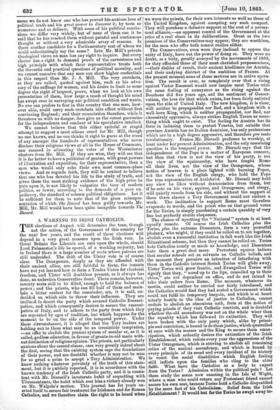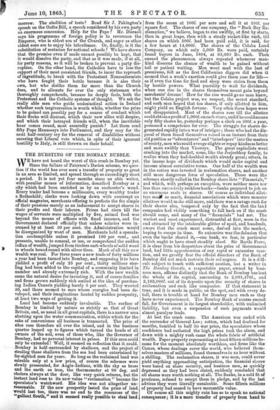A WARNING TO IRISH CATHOLICS.
THE elections of August will determine the tone, though not the action, of the Government of this country for the next few years, and the result of those elections will depend in a very great measure upon the Irish vote. In Great Britain the Liberals are sure upon the whole, should lord Palmerston's life be spared, of a working majority, but in Ireland there is a large number of seats whose patrons are still undecided. The drift of the Ulster vote is of course clear. The Orangemen, deeply as they are offended with their ancient allies, are still faithful to them, the tenants have not yet learned how to form a Trades Union for electoral freedom, and Ulster will doubtless present, as it always has done, an unbroken Conservative front. There remain, however, seventy seats still to be filled, enough to hold the balance of power ; and the priests, who can fill half of them and main- tain a bitter contest for the remainder, are, it is said, un- decided on which aide to throw their influence. They are inclined to desert the party which secured Catholic Emanci- pation, and which consequently desires to secure the emanci- pation of Italy, and to adhere to the party from which they are separated by ages of tradition, but which happens for the moment to be on the side of the temporal power. Under these circumstances, it is alleged that the Tory leaders are holding out to them what may be an irresistible temptation, —an offer to abolish the present system of secular or, as it is called, godless education, in favour of grants-in-aid made with- out distinction of religious opinion. The priests; not particularly anxious about the second clause, care very greatly indeed about the first, seeing that the existing system saps the foundations of their power, and are doubtful whether it may not be wise for so great a prize to accept a Tory Administration. We know nothing whatever privately of the truth of this state- ment, but it is publicly reported, it is in accordance with the known tendency of the Irish Catholic party, and it is consis- tent with Mr. Disraeli's inveterate habit of coquetting with Ultramontanes, the habit which cost him a victory already won on Mr. Walpole's motion. This journal has for years ex- erted itself to secure fair treatment for Irishmen and for Roman Catholics, and we therefore claim the right to be heard when we warn the priests, for their own interests as well as those of the United Kingdom, against accepting any such compact. They will purchase a delusive support at the cost of a perma- nent alliance,—an apparent control of the Government at the price of a real share in its deliberations. Great as the two promises of the Conservatives may appear, they are worthless, for the men who offer both cannot realize either.
The Conservatives, even were they inclined to oppose the unity of Italy, have not the power of doing so. They were no doubt, as a body, greatly annoyed by the movements of 1859, for they offended three of their most cherished prepossessions, —their dislike of revolt, their ancient kindliness for Austria, and their undying distrust of the ambition of France. At the present moment none of those motives are in active opera- tion. The revolt is over, so completely over that a rising against Victor Emanuel would now inspire most Tories with the same feeling of annoyance as the rising against the Bourbons did five years ago, and the sentiment of Censer- vatism, the love for that which exists, has been fairly enlisted upon the side of United Italy. The new kingdom, it is clear, will neither be propagandist nor Red, and a kingdom with a well-born King, which is neither propagandist, nor Red, nor excessively oppressive, always strikes English Tories as some- thing which ought to exist. The feeling for Austria has its force in inducing them to protect Venetia, but outside that province Austria has no Italian dominion, has only pretensions which are in a high degree aggressive, and therefore pro tanto- revolutionary. France Mr. Disraeli professes to worship, at least under her present Administration, and the only remaining question is the temporal power. Mr. Disraeli says that the independence of the Pope is a matter of European concern,. but then that view is not the view of his party, is not the view of the squirearchy, who have fought Rome all their lives, not the view of the Orangemen, whose notion of heaven is a place lighted with burning Popes, not the view of the English clergy, who hold the Pope the true representative of Antichrist. Mr. Disraeli may hold. any view he likes without denunciation from them, but if he acts on his view, squires, and Orangemen, and clergy, will quietly recede from his side, and without the support of those three classes a Tory Government could not endure a week. The inclination to support Rome must therefore evaporate in words, and the priest who on that ground votes. for the Tories, is simply purchasing a certain quantity of very fine but perfectly sterile eloquence.
The chance of upsetting the "National" system is at least equally remote. Of course the Irish Catholics plus the Tories, plus the extreme Dissenters, form a very powerful phalanx, who might, if they could be relied on to act together, abolish even a successful institution in full work like the Irish Educational scheme, but then they cannot be-relied on. Tories hate Catholics nearly as much as knowledge, and Dissenters hate them a great deal more. Protestant squires believe that secular schools act as solvents on Catholic beliefs, and the moment they perceive an intention of interfering with them in the Catholic interest Scotch Tories will glide away, Ulster Tories will grow frantic,. and Evangelical Tories will signify that they, " acred up to the lips, consolled up to their chins," are not dependent on office, and do not intend to take their orders from Rome. The measure, whatever its merits, could neither be carried nor fairly introduced, and the Catholics would find they had seated a Government which could not fulfil its temporary bargain, and which is at heart utterly hostile to the idea of justice to Catholics, cannot endure to abolish an obnoxious oath, frets at the notion of paying priests if they visit Catholic convicts, and is doubtful whether the old ascendency was not on the whole wiser than the equality which has followed its extinction. They will have broken with the only party which, alike by princi- ple and conviction, is bound to do them justice, which quarrelled at once with the masses and the King to secure them eman- cipation, which ardently desires the extinction of the Irish Establishment, which resists every year the aggressions of the Ulster Orangemen, which is striving to abolish all remaining relics of the ancient ascendency, and which is bound by every principle of its creed and every incident of its history to resist the social disabilities which English feeling still inflicts upon the families who cling to the elder faith. What have the Catholics as a body to expect from the Tories ? Admission within the political pale ? Let them study the scene now enacting in the Isle of Wight, where a man who could return any Protestant friend cannot secure his own seat, because Tories hold a Catholic disqualified by the mere fact of his Catholicism. Relief from the Irish Establishment ? It would but for the Tories be swept away to- morrow. The abolition of tests? Read Sir J. Pakington's speech on the Oaths Bill, a speech considered by his own party an enormous concession. Help for the Pope ? Mr. Disraeli says his programme of foreign policy is to reverence the Emperor, who is eldest son of the Church, and eager as other eldest sons are to enjoy his inheritance. Or, finally, is it the substitution of sectarian for national schools ? We have shown that the promise even if made cannot possibly be kept, that it would dissolve the party, and that as it was made, if at all, for party reasons, so it will be broken to prevent a party dis- ruption. On the other hand, the Catholics have to lose the support of their most consistent friends, to incur the reproach of ingratitude, to break with the Protestant Nonconformists who have fought their battle because it is also their own, but who dislike them far more than the Church does, and to alienate for ever the only statesman who thoroughly comprehends, because he deeply feels, both the Protestant and the Catholic systems of thought. We ask the really able men who guide ecclesiastical action in Ireland whether such tergiversation is worth while, whether the prize to be gained can possibly pay for a course of conduct which their flocks will distrust, which their new allies will despise, and which their betrayed friends will, when the inevitable hour comes round, most assuredly punish ? Let them send fifty Pope Hennessys into Parliament, and they may for the next half-century cry for the removal of disabilities without securing that Liberal vote which, in spite of their ignorant hostility to Italy, is still thrown on their behalf.































 Previous page
Previous page